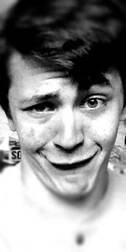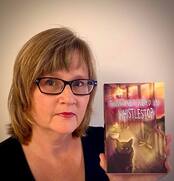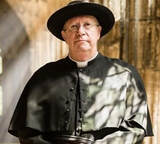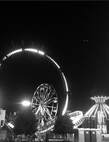Sacred Chickens
Menu
SACRED CHICKENS
 Calling the World Saint Flashlight and The Poetry Society of America We could all use a lifeline right now and what could be better than poetry? Saint Flashlight is partnering with the Poetry Society of America to bring us just that. We've featured Saint Flashlight here before - they're two poets and good friends who bring poetry into the public sphere. Unfortunately, the public sphere is a little dicey right now due to the pandemic. That's where dialing for poetry comes in.
0 Comments
 Chapter 1 The Thin Hungry Man Has an Idea ...and it Hurts By Julie Carpenter The Thin Hungry Man is on the move again...before we catch up with him, let's go back and see how he got into this mess in the first place. Once upon a time in a deep, dark forest far, far away, a very tall and incredibly thin man was hiking through a large and beautiful forest. He was very thin because he had no food. He had no food because there was not even one grocery store in the whole forest. However, he never managed to die because he was, in fact, only a storybook man and not a real man at all. In story books, of course, death does not come for the asking or the wishing; it comes at the will of the author. This thin storybook man suffered only from the incredible thinness mentioned above, and of course, a more incredible hunger, all because the author who had created him didn’t allow him to die and because she hadn't included a grocery (or even a mini-mart) of any kind in the forest. The most heartbreaking part of all was that the poor man didn't even realize that there was no such thing as food in the forest, and so he kept hiking endlessly in the hope that eventually he would find food. Perhaps the author was really no good at all at characterization; at any rate she had given the poor man very little in the way of sense or knowledge before abandoning the story, which now resided in a red paper folder inadvertently tossed under her couch. With his precarious world unlikely to be disturbed, the Thin Hungry Man was trapped in a plot which was unlikely to be resolved. It could be said that the only real sense or knowledge that the Thin Hungry Man had was of a lack; his only drive was the gnawing hunger. This hunger formed all there was of his character; it was his only gift. The rest of the creation, if one surveyed it, seemed perfect. The forest was absolutely ideal. It was lush and beautiful, a virgin forest- completely peaceful except for the confused wanderings of the Thin Hungry Man. The trees were widely spaced and their branches and leaves laced themselves together over most of the forest, leaving the sunlight to filter through a canopy of emerald with fragments of gold flickering here and there and beautiful clearings filled with warm, clear light. One of these clearings contained a lovely little pond in the very middle of it, with a few darting silvery fish playing in the clear, clear water. There were birds and squirrels frolicking in the awning of trees. There were rabbits skipping about on the green floor of the forest. Snakes and bears and lions were never to be seen. It might have come from a fairy tale such a lovely scene it was, not too original perhaps but enticing nonetheless, and nicely done in its way. However, the land outside the forest appeared to be a huge void of nothingness. It was as if the author had had no idea what to do with it, or perhaps she simply had not done anything with it yet, or perhaps there was a reason for the existence or non-existences of the nothing. But to the Thin Hungry Man it was the wall that formed his prison. The Thin Hungry Man wandered through the beauty day after lonely day with no thought of anything but his hunger. He did not ponder the reasons that he seemed to be surrounded by nothing. He did not curse the hand that had created him. He simply searched night and day for something that would cure the ache in his belly. And so the Thin Hungry Man found himself alone, utterly and completely alone in his world, not that he'd ever known himself to be otherwise. The absence of his creator made little difference in his paltry life. It went on much as it had before in an endless and meaningless search for food. Of course, his search would have been made easier by far had he had a better idea what it was he was looking for. He had a vague and distant idea about food. He somehow knew that there was in existence something that would stop the pain in his middle. Unfortunately, nothing that he found in the forest seemed to match his half-formed ideas of food. His brain couldn't seem to pull his fibrous, hand-me-down thoughts together in any kind of coherent pattern. They swirled about bumping into one another and scattering, holding out the promise of food without making clear the actions to be taken. Still he clung quite fiercely to that tiny shimmering hope. It was indeed a marvelous feat of emotional will, to be accomplished by someone so ignorant and weak as himself. So each day at sunrise he once more got up and, weary and hungry though he was, traversed the forest in search of breakfast, and quite sadly continued the search through lunch and dinner. Many times in his quest he had come upon the little pond, and sometimes on those occasions he sat in front of it for a time and looked at himself reflected in the water. Each time he noticed his reflection in the water, a multitude of half-formed thoughts came rushing in upon the image, and he always sat very still, hoping to capture one and decipher its meaning. That image of himself, himself and not himself, had given him a vague and curious wondering about otherness. Had he not been so hungry it might have been a more absorbing interest. There were many fish, all as alike as possible, and yet separate. The only other thing like himself that he had seen was this shivering green and gold image in the water. And since he couldn’t see himself very well, even that was conjecture. But the image in the water had hands, like his hands, and moved when he moved. This was a poor reflection of the partnered dance of the many fish, flickering and flashing one behind the other, now reflecting, now opposing each other's movements. He didn't sit pondering these things for very long though. He was too hungry. The thought of eating his forest companions did not occur to him and he had no one to teach him how to hunt or gather food. And he might have been hard pressed in his weakened state to catch any of the quick happy creatures in the forest. He had once tried grass like the rabbits but it did nothing to stop the pain. The search for food went on and on. Considering that it was happening inside the pages of a story and not in reality as non-fictional people experience it, there is no way to assess exactly how long that was. To the sad man trapped in the reality of the incessant hunger it must have seemed just one second short of eternity. It could have indeed been endless, had it not been for a rather unexpected turn of events. One day, as always, he was hiking through the forest in search of food, when suddenly it came to him. He realized that there was no food in the forest. The thought struck him so hard that he fell down. It was the first time that a fully formed idea had presented itself to him. But it was not the thought itself, as much as the extremely disconcerting nature of the idea that affected him in this way. The thought that there was simply nothing in the forest that matched his poor ideas of food was too much. He realized that there was no longer any point in his one ritual, the daily search for sustenance. He lay on the ground and cried. He cried until darkness came and the moon rose in its shimmering, distant beauty and put him uneasily to sleep. And so his first real thought was not a happy one. It was only a knowledge of the deficiency of his world. He knew beyond a shadow of a doubt that he would never find what he must have. When the Thin, Hungry Man woke up the next morning he jumped up ready to start his search once more, and then he realized. There was no more need to search. This fact abruptly deprived his life of all meaning. He suddenly found himself facing questions, questions that were very difficult for a hungry, weak brain on the morning after the world has fallen apart. If there was no food to be found in the forest, where did one look for food? The edge of the forest seemed to be the edge of everything. He could not see beyond its border. Of course, nothing existed outside the forest, so there was nothing to see. Escaping the forest seemed impossible. He thought about it for a while. He got up. There seemed to be nothing left to do. He was altogether tired of being hungry. He looked at the forest around him. It had appeared much more pleasant when he had believed there might be food in it. He began walking. He was walking very fast. He had made up his mind. It wasn't a good mind for making plans but he had come up with a rather desperate one. He walked until he came to the edge of the forest. He looked, or tried to look, beyond the trees. Considering the fact that nothing is not easy to see nor is it easy to make sense of, what the man did next was fairly remarkable. He took a running start and leapt into it.  Bio: Julie Carpenter is the creator of the Sacred Chickens website and Author of Things Get Weird in Whistlestop. She is dedicated to telling stories and making sure that indie writers and publishers have a way to be heard. She uses narrative, her own and others’, to help interpret the world. She has a Master of Professional Writing from the University of Memphis, with an emphasis in Composition Theory. She wants to bend reality one story at a time. Julie’s work has appeared in Fiction on the Web and will be included The New Guard. She is currently working on a novel and starting a podcast where people can tell her about their weird ideas.  Photo by Álvaro Serrano on Unsplash Photo by Álvaro Serrano on Unsplash Twenty-three to Twenty-one Author Michael Ceraolo The following short poems are from Twenty-Three to Twenty-One, so titled because a woman named Julia Sand wrote 23 letters to Chester Arthur, the 21st President. Her letters total over 150 pages, and the author has condensed and re-arranged them as well as adding a few imagined parts as connective tissue. If Arthur ever responded to her letters, no response is known to have survived, therefore the author has used his imagination to come up with responses.  Talking to Spiders by Jarad Johnson Spiders, in my opinion, are seriously misunderstood creatures (Me and Hagrid are on the same page). They can be beneficial insects, eating other pests both indoors and outdoors. They can also bite you, which is not so great. But hey! You win some you lose some. C’est la vie and all that crap. They particularly seem to like my front porch. There are whole families out there, and I don’t know whether or not to remove them. On one hand, I’d like to be able to sit out there and drink tea, but I would also feel bad. Who are they hurting? Well, insects, but nothing else.
 All I Ever Wanted: A Rock 'n' Roll Memoir Kathy Valentine review by Roy Peak I'd been playing bass for a few years when the Go-Go's first album came out, so after a steady diet of Dee Dee Ramone, Bill Wyman, John Entwistle, and various surf rockers, the bouncy pop energy that Valentine brought to the punky Go-Go tunes was fun and refreshing. Solid, tight with the drums, always in motion, fluid and powerful. Definitely something my young rock & roll brain latched onto. As far as I know, I was the only one in my high school who liked them, as everyone else was into bands like Journey, Styx, and REO Speedwagon. Sigh.
 Digging In: Fairy Tale Witches- Part Two by Jarad Johnson Witchcraft and witches are a motif across many literary and cultural themes, so it’s only fitting that they appear in fairy tales as reflections of the culture they come from. Although the fantasy genre has many different variations on the witch, when they pop up in fairy tales, they’re usually up to no good. Baking and eating small children and handing out poison apples. But witches have changed a little over time. Let’s look at some of these stories from long ago and their modern counterparts to see what it tells us about culture and women’s roles and exactly how witches got to be so wicked - at least in the eyes of those who told these stories. (Remember, this is a look into how western culture came to portray witches as evil! It does not reflect the feelings of any of us at sacred chickens about the long history of herb women, witches, or anyone who currently professes paganism or practices holistic medicine.)
Last time we explored how Fairy Tale Witches got to be wicked. The evil witch in the fairy tale reflected how the surrounding culture felt about women, especially women with power or childless women. These conflicted feelings created the monstrous image of the anti-mother, a twisted reflection of the only role women could be conceived of having. The witch motif, like fairy tales themselves, has changed with onset of fairy tale retellings. In understanding the entire perspective of the witch motif, retellings provide a new facet in that area. The retellings this paper will cover are, “When the Clock Strikes,” and, “Snow, Glass Apples.” Each of these stories contain a witch, but unlike the traditional tale, the witch has depth of character and is an overall more rounded out character than she would usually be.  Scott Branks reads in the red room of the KGB bar Scott Branks reads in the red room of the KGB bar The Special Magic of the Writer's Hotel by Julie Carpenter Here at Sacred Chickens, one of our main goals is encouraging emerging writers, helping you find a first home for your words, providing inspirations with book reviews and original writing and trying to point you toward things that might help you grow as a writer. As such, we are more than happy to recommend The Writer’s Hotel. This year’s conference will be held online so there’s nothing holding you back from attending! If you want to see your writing grow by leaps and bounds…please click through this link and check out the benefits. The deadline is coming up fast on August 22, 2020.  Photo courtesy of BBC Photo courtesy of BBC Review of Father Brown Season 8 by Julie and Jarad Introduction: Julie got hooked on this series when she had dental surgery last year and passed the obsession onto Jarad – even Morty, that cantankerous old soul, sneaks in a viewing now and then. You may be thinking…hmmm…recommendations from people who are loopy from anesthesia and pain meds. For the record, she went for local anesthesia and laughing gas and she can’t take opioids so she was in about as right a mind as she ever manages on an average day. But it is true that, as you might suspect, the show is along the lines of comfort food. Like your grandmother’s mashed potatoes and mac and cheese (or Mrs. McCarthy’s award winning strawberry scones…you haven’t met her yet, but you should.)
 The Violent Life of the Garden By Julie Carpenter This is a picture taken from my front porch. My roses are in full bloom. I have a lot of them. Thirty-one rose bushes I think. I have a vegetable garden and chickens and two dogs and three cats. I have lilies and lemon balm and bee balm and catmint and lavender and rosemary and peach trees. There are birds in the trees and a groundhog that may be living under our storage shed. There are rabbits that run like mad men across our driveway every time we drive the car up or down it. (I don't know exactly why they have a rule about waiting to cross the road until they see a car. They should rethink it.) I have squirrels quarreling in the trees that hang off my deck. I like living things. I like to be surrounded by things that grow and run and make noise and bother me. (Thus the family. Just kidding family!).
 5 Poems by Ryan Quinn Flanagan 4 Hobby Horsemen of the Apocalypse
I find one of those old hobby horses digging through storage. A brown horse head on a stick that I put between my legs and gallop around just like the kiddies do. But it is boring to ride indoors. I look out to the street. All that pavement. I want the wind flowing through what is left of my hair. If only I could enlist three others with their own hobby horses, I think. We could all ride in together. 4 Hobby Horsemen of the Apocalypse. Like a biker gang, but with more purpose. The neighbours would flee in fear. Men and women screaming with terror. Our horses neighing each time we took turns making the noises. |

Click Photo above to buy ebook or paperback from Amazon.
Here's the link to Barnes and Noble Or order through your favorite independent bookstore! Categories
All
|
 RSS Feed
RSS Feed